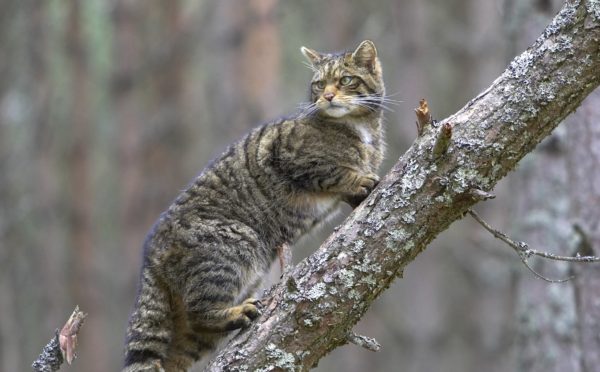
A landmark international study looking at how the wildcat population has been diluted by breeding with domestic cats across Europe failed to identify a single pure animal in Scotland.
The genetic study, published last week in the journal Conservation Genetics, said it confirmed the wildcat population in Scotland was “seriously compromised”.
The study analysed the DNA of 926 cats for the study on “hybridisation” – where wildcats have mated with domestic and feral cats to produce a cross-breed or hybrid.
Wildcats and domestic cats are different species but can still mate.
The samples, taken between 1999 and 2016, differed markedly across the 13 European countries.
All areas showed some degree of hybridisation but none more so than Scotland.
All 17 Scottish wildcats analysed were not wildcats at all but second-generation hybrids.
The study, carried out in partnership by 21 American and European organisations, including National Museums Scotland’s Department of Natural Sciences, said it was the first large-scale assessment of hybridisation in European wildcats.It said: “In Scotland, we found exclusively hybrids of different classes, indicating hybridisation has been occurring for several generations.”
It added: “All samples from Scotland were identified as hybrids…supporting previous findings that the genetic integrity of that wildcat population has been seriously compromised.”
But the Scottish findings were in stark contrast to other areas of Europe where just 3%- 21% of wildcats were hybrids.
It found the lowest proportion of hybrids (3%-5%) was in western central Europe, central Germany and south-east Europe.
It also found the first example of a hybrid cat in the Eastern Alps of Austria.
The report added: “Nevertheless, frequent hybridisation with the domestic cat may regionally threaten the genetic integrity of the European wildcat, as documented by the example of the wildcat in Scotland and potentially leading even to the genetic extinction of local populations.”
The study comes as wildlife bodies in Scotland draw up plans to fight the decline of our native wildcat species, which has been present since the last Ice Age.
The Royal Zoological Society of Scotland (RZSS) is to begin reintroducing pure wildcats to the Scottish countryside in 2022 as part of a multi-million-pound Saving Wildcats recovery project.
Dr Helen Senn, head of conservation and science programmes at RZSS, said the new study tied in with the charity’s own findings.
“Crossbreeding with domestic feral cats has long been known to be a major threat to wildcats in Scotland and our genetic research, published in 2018, confirmed with a large sample size of cats from across Scotland, the finding that the vast majority of Scottish wild-living cats are hybrids,” she said.
The new wildcat population, which may be released in the Cairngorms, will come from animals bred in captivity from Scottish-caught animals and purebred cats from Europe.

Enjoy the convenience of having The Sunday Post delivered as a digital ePaper straight to your smartphone, tablet or computer.
Subscribe for only £5.49 a month and enjoy all the benefits of the printed paper as a digital replica.
Subscribe